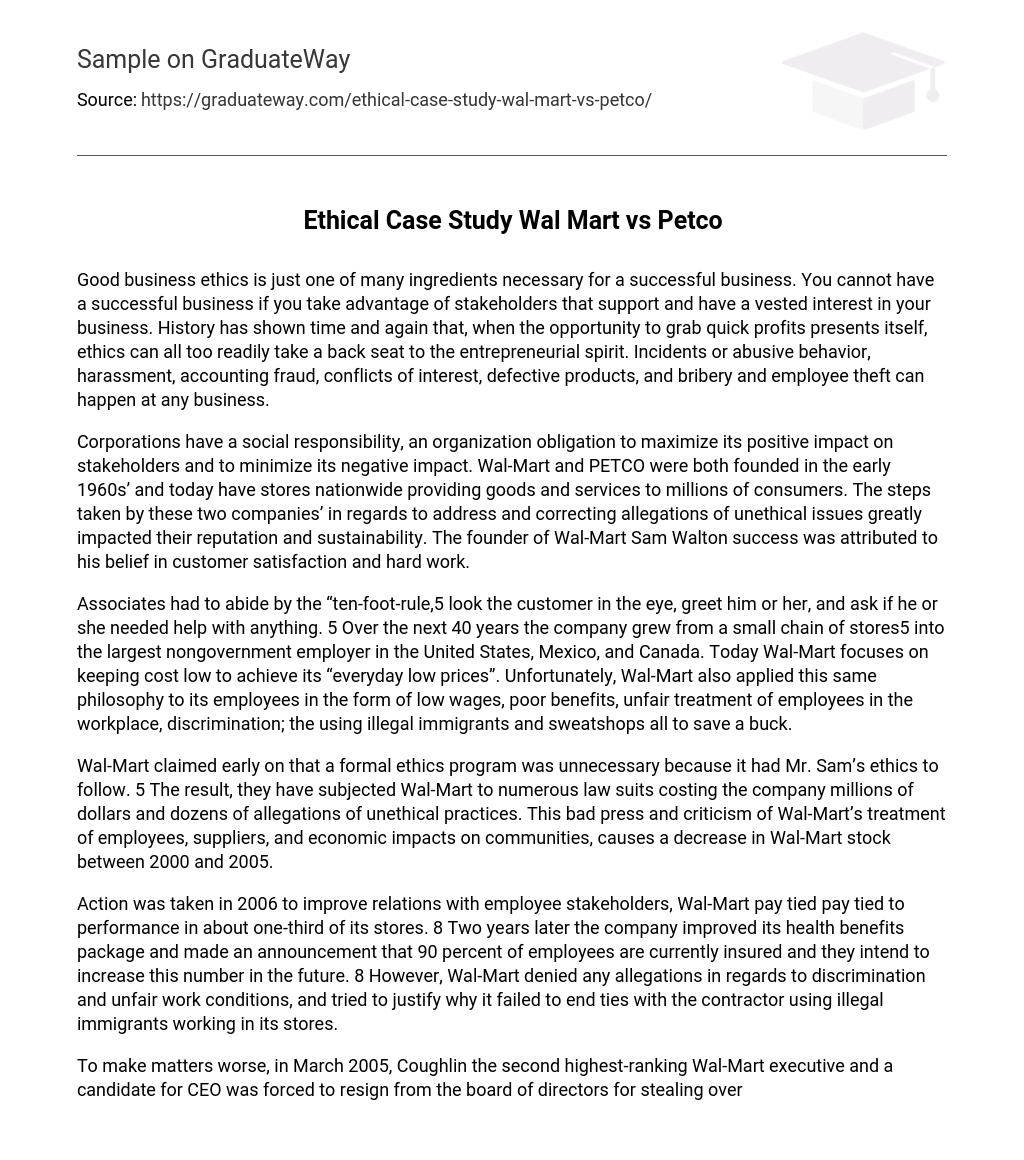The adherence to good business ethics is crucial for the success and long-term survival of a business. Failing to practice ethical behaviors and exploiting stakeholders can impede growth and sustainability. Unfortunately, there have been numerous historical cases where prioritizing immediate financial gains overshadowed the significance of conducting business ethically. These instances encompassed various issues, including abusive behavior, harassment, accounting fraud, conflicts of interest, defective products, bribery, and employee theft that may potentially arise in any business environment.
Both Wal-Mart and PETCO were founded in the early 1960s and have nationwide stores that provide products and services to a diverse group of consumers. These companies understand the importance of making a positive impact on stakeholders while minimizing negative consequences. They have made substantial efforts to address and resolve accusations of unethical conduct, resulting in a significant impact on their reputation and long-term sustainability. The accomplishments of Sam Walton, the founder of Wal-Mart, can be attributed to his dedication to customer satisfaction and strong work ethic.
The “ten-foot-rule” mandated that associates must interact with customers by making eye contact, greeting them, and offering assistance. This requirement played a crucial role in the company’s growth over the next four decades, transforming it from a small chain of stores into the largest private employer in the United States, Mexico, and Canada. Currently, Wal-Mart’s primary focus is to maintain low costs in order to provide “everyday low prices.” However, this strategy has resulted in negative consequences for employees such as inadequate wages, insufficient benefits, unjust treatment at work, and various forms of discrimination. Furthermore, the company has faced criticism for employing unauthorized immigrants and operating sweatshops as cost-cutting measures.
Initially, Wal-Mart believed that a formal ethics program was unnecessary as they followed Mr. Sam’s ethical principles. However, this choice caused the company to face several lawsuits and experience substantial financial losses. Furthermore, Wal-Mart has been accused of participating in unethical behavior multiple times, resulting in unfavorable media attention and criticism regarding their treatment of employees, suppliers, and impact on communities. Consequently, from 2000 to 2005, the stock value of Wal-Mart declined.
In 2006, Wal-Mart took steps to improve employee relationships by introducing a pay-for-performance system in approximately one-third of its stores. Over the course of two years, the company also expanded employee benefits and stated that 90% of workers now have insurance coverage, with plans for additional improvements. However, despite these efforts, Wal-Mart denied allegations of discrimination and unfair working conditions while defending its decision to keep a contractor who hired undocumented immigrants at its stores.
In March 2005, Coughlin, the second highest-ranking executive at Wal-Mart and a potential CEO candidate, was forced to resign from the board of directors due to allegations of embezzlement totaling more than $500,000. Around the same time, concerns were raised about Wal-Mart’s failure to follow proper environmental practices. Consequently, a grand jury in Los Angeles issued a subpoena demanding documents and information relating to possible environmental wrongdoing. To restore its ethical reputation, Wal-Mart has taken steps including appointing new leaders, participating in community activities, and creating an ethics program.
Despite investing significant funds in rebuilding its reputation, Wal-Mart has demonstrated its commitment to ethics and stakeholders through various means. These include placing full-page newspaper ads, making charity donations, participating in disaster management projects, and catering to special interest groups by adopting eco-friendly practices and promoting the sale of “green” products. Moreover, the company has implemented the “Global Responsible Sourcing Initiative,” which encompasses guidelines and requirements for new supplier agreements. Nevertheless, Wal-Mart has not acknowledged any wrongdoing and has only offered limited training for its managers and employees.
Walter Evans founded a mail order veterinary supply store which is now known as PETCO – one of the largest pet supply specialty retailers in the country with over 950 stores. PETCO has implemented a thorough code of ethics program that prioritizes the well-being of animals. Additionally, PETCO’s code of ethics includes guidelines for addressing other stakeholders such as employees, customers, and businesses. It also covers various aspects of the business including selling practices, advertising policies, pricing, and buying practices. PETCO operates in a highly competitive industry, competing with major companies like Pet Smart and Wal-Mart.
Despite PETCO’s commitment to pets and animals in general, the company has not been immune to incidents of unethical behavior by its employees. From 2000 to 2005, PETCO faced various allegations including animal cruelty and neglect, overcharging customers on sale items, and contamination of pet food resulting in the deaths of pets. However, PETCO demonstrated a willingness to acknowledge and rectify mistakes by severing ties with North American Pet Distributor, Inc., increasing manager and employee training on animal care, and promptly responding to FDA recall notices. The company’s ability to address and resolve such issues highlights the effectiveness of its ethics program. Moreover, PETCO’s swift response to negative incidents and its support of fundraisers within the pet industry such as Think Adoption First, Tree of Hope, and We are Family indicate a genuine desire to do what is right. By training its employees to make ethical decisions, PETCO ensures both success in the marketplace and positive contributions to society.
However, Wal-Mart is making efforts to enhance stakeholder relations. Nevertheless, its future initiatives related to sustainability and social responsibility have caught the attention of consumers. The company’s new ethics and compliance program shows progress, but only time will determine if it can prevent another controversy.





